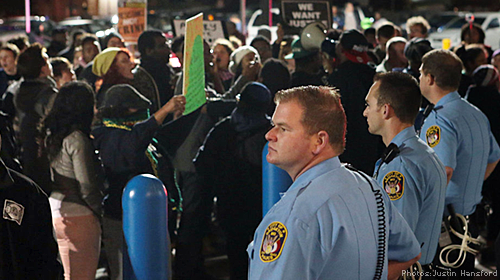Sarah Ford | January 20, 2015
From the Fair Housing Act to Ferguson: Where You Live Impacts How You’re Policed
In less than 24 hours, the Supreme Court will hear a case that will define the future of decades-old legal protections against discrimination by landlords and banks against renters and homebuyers. The decision could have far-reaching consequences for the battle against housing policies that discriminate on the basis of race, sex, religion, disability, and other protected characteristics. And that, in turn, would have profound implications for efforts to ensure fair and unbiased policing in places like Ferguson and New York City and throughout the country.
Passed in 1968, the Fair Housing Act is one of the major legislative victories of the civil rights movement. It has helped rid our country of the most overt forms of housing discrimination, such as building single-race housing developments and using lending maps that demarcated black neighborhoods as mortgage-free zones.
But discrimination hasn’t gone away – instead, it has subtly morphed, preventing us from creating truly diverse communities.

Get Resources and Insights Straight To Your Inbox
Explore More Articles
Data Processor & Customer Service Representative, Charitable Funds Management Solutions
Reporting Structure: Director, CFMS Term: October 2025 to February 2026 Schedule: Full-Time; Monday-Friday up to 37.5 hours per week. Rate: $20 per hour Overview of…
Read ArticleCustomer Support Agent (Remote – Part Time)
Department: Charitable Funds Management Solutions We are a nonprofit charitable organization looking for skilled individuals who can coordinate multiple client requirements related to fund processing and…
Read ArticleGet Resources and Insights Straight To Your Inbox
Receive our monthly/bi-monthly newsletter filled with information about causes, nonprofit impact, and topics important for corporate social responsibility and employee engagement professionals, including disaster response, workplace giving, matching gifts, employee assistance funds, volunteering, scholarship award program management, grantmaking, and other philanthropic initiatives.



